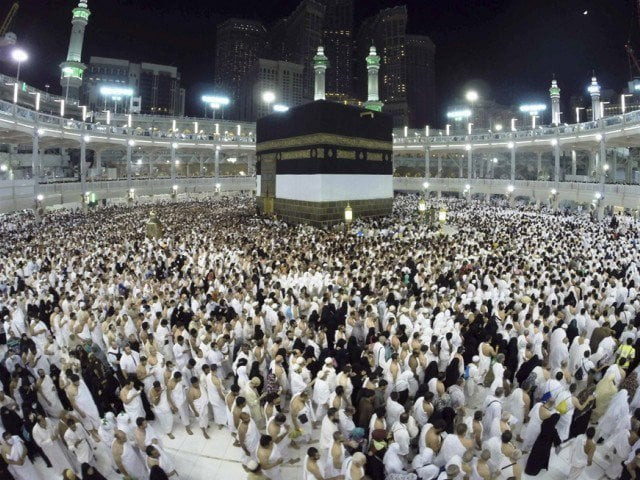'IS presence in Saudi Arabia threatens security of Hajj pilgrims'
Security analyst says it won't be surprising if IS militants tried to take advantage of Hajj to stage an attack

Muslim pilgrims pray around holy Kaaba during the annual Hajj pilgrimage in Makkah October 1, 2014. PHOTO: AFP
Although there isn't any hard evidence of a strong presence of the hard-line militant group in the Kingdom, the group seems to be determined to bring down the US-allied royal family of Saudi Arabia.
Read: Islamic State attacks Syrian air base in east, dozens reported killed
The IS, which is infamous for its atrocities against innocent people across the Middle East, has rapidly ramped up its rhetoric to undermine the al Saud royal family’s legitimacy.
"IS and its followers have made it very clear that Saudi Arabia is their ultimate target,” the newspaper quoted Saudi analyst Fahad Nazer as saying. “Because of Makkah and Madina … That’s their ultimate prize.”
Militants affiliated with the extremist organisation have successfully carried out at least three major bombings — two in eastern Saudi Arabia in May and one in Kuwait City in June, all of them targeting Shia mosques, killing as many as 53 people.
Last month, a suicide bomber attacked a mosque in western Saudi Arabia inside a police compound in Abha, which is only 350 miles south of Makkah, killing 15 people in one of the deadliest attacks on the kingdom’s security forces in years.
At least eleven of the dead belonged to Saudi Arabia’s elite counter-terrorism unit whose tasks include protecting the Hajj pilgrims.
Hajj commences on September 21 this year and is expected to draw some 3 million Muslim pilgrims from around the world.
“It will not be surprising if the IS militants tried to take advantage of the Hajj to stage an attack, particularly since the group has encouraged lone wolf operations,” Gulf security analyst at the Washington Institute, Lori Boghardt, said.
Read: Al Qaeda chief calls Islamic State illegitimate, but suggests cooperation to fight the West
“The kingdom is a holy grail of sorts as a target from the perspective of ISIS because of its significance to Muslims,” she said, referring to the group by its longer acronym.
Although a direct attack on pilgrims performing holy rites may be a risky move for the militant group which can potentially trigger a backlash from Muslims worldwide.
But the group “has already made it very clear that they have no red lines,” said a senior analyst at the Virginia-based consultancy and security firm JTG Inc.
It is not clear if the militants carrying out attacks in the kingdom have direct operational ties with the group’s leadership in Iraq and Syria or they are operating independently in the name of the group. However, all four attacks in the kingdom involved young Saudis, suggesting the group’s ranks are largely home-grown as opposed to foreign militants.
In order to curb the potential radicalisation of its citizens, the late Saudi King Abdullah last year put a ban on Saudis fighting abroad but by then, some 2,500 had already gone to take part in a rebellion against the Syrian government of President Bashar al-Assad.
Around 650 have since returned after becoming disillusioned with the fighting, claims the Saudi interior ministry. Saudi Arabia and other Gulf countries joined the US-led campaign against IS in Syria this year.
The IS militants denounce the royal family as ‘tyrants’ who are ruling Islam’s heartland without implementing what the group calls its ‘true teachings’. “Pledge allegiance to the Islamic State,” an IS supporter tells Saudis in an audiotape which surfaced last month.
Read: Islamic State demands ransom for Chinese, Norwegian hostages
Saudi Arabia is already run by one of the most ultraconservative interpretations of Shariah, known as Wahhabism. But Wahhabi clerics make a crucial distinction, preaching that the recognised ruler — in this case, the al Sauds — must be obeyed. They condemn protests or violence that could lead to instability.
This article originally appeared on The Indian Express.



















COMMENTS
Comments are moderated and generally will be posted if they are on-topic and not abusive.
For more information, please see our Comments FAQ